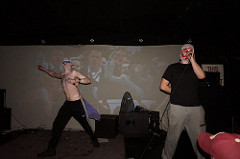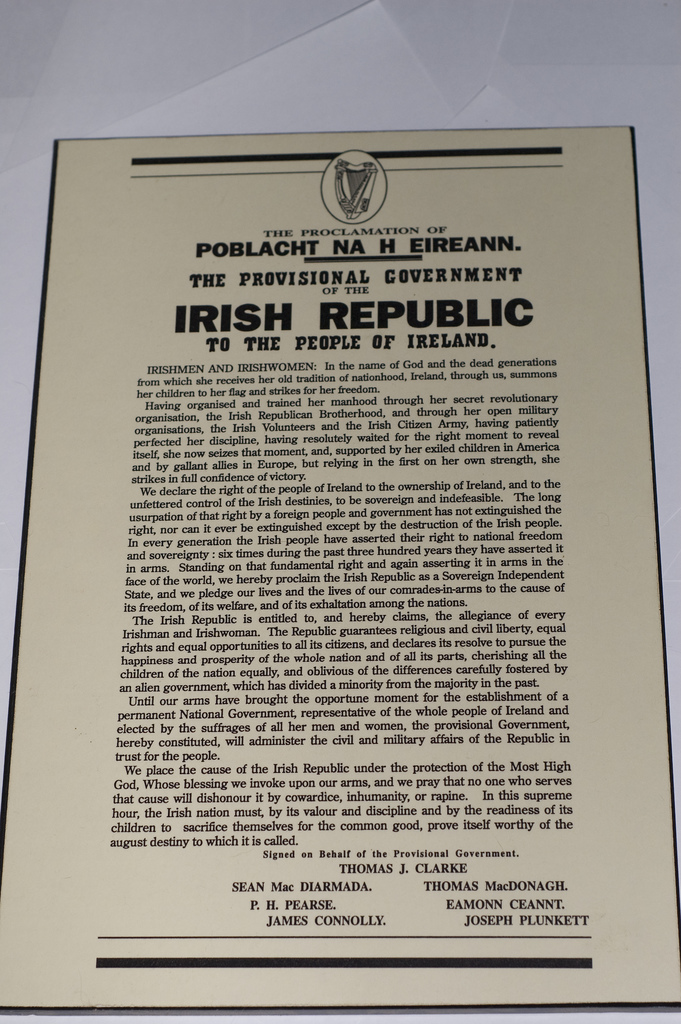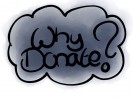Here’s what I think I know about the Easter Rising:
- It happened a hundred years ago on Easter Monday 1916
- That’s not actually a hundred years ago. Easter Monday in 1916 wasn’t until April 24th. But this weekend is the long weekend so we might as well commemorate it now?
- A bunch of lads (and also Constance Markievicz) tried to declare the Irish Republic while the Brits were distracted with WW1.

Constance Markievicz: RIDE. Photo by National Library of Ireland on The Commons - The Brits weren’t that distracted.
- Everything that could go wrong, did. The guns got chucked into the sea. Everyone got mixed messages about when they were meant to be having the revolution in the first place. Not surprising, when you remember that it was a bunch of poets and philosophers planning the thing. Military logistics may not have been part of their skill sets at the time.
- They took over the General Post Office in Dublin. And some other places? A bridge, I think? Maybe a park?
- At the time, most people in Dublin were about as impressed by the Rising as they are by the Luas strikes this week: not at all.
- The great Hanna Sheehy Skeffington’s husband (Mr Sheehy Skeffington?), got executed while he was trying to stop people looting. I learned this from a bus stop the other day. The S-S’s were massive feminists and Mr S-S had one of the greatest beards of the early 20th Century, until he was killed.
- Hundreds of people were killed.
- The British Army bombed the city centre almost to the ground. They left the front wall of the GPO, though. That’s handy ’cause it left us a nice sheltered spot to get up on soapboxes and Have Opinions of a weekend afternoon.
- After a few days (five? I think it was five?) the leaders surrendered. A few weeks later they were executed by firing squad.
- One of them- Plunkett, I think?- got married the same day he was shot.
- James Connolly had already been shot to bits in the Rising so they had to tie him to a chair in front of the firing squad.
- Constance Markievicz was pissed that they were too cowardly to execute a woman.
- Irish people love an underdog. Killing the leaders of the Rising was a bloody awful idea. Especially if you give them a few weeks to write noble, brave letters to the people they love and have poignant last moments where they stare unflinchingly into the rifles and whatnot. It pretty much set in motion the War of Independence and lost Britain this bit of its empire.
- You can’t throw a stone these days in Ireland without hitting something named after one or the other of them. Connolly, Pearse, and Ceannt (and maybe more?) got train stations. Markievicz got a swimming pool.


In fairness, that’s not bad for a combo of history classes in the 90s and that programme the Rubberbandits did back in January.
Lucky for you, some other people are far more knowledgeable than I.
The events of 1916: Overview and Accounts
To get you up to speed on what happened in the Rising, this video of the story told though Lego figures is charming. It’s also almost certainly more accurate than my own impressions.
I’ve always been a sucker for contemporary voices and accounts of events. TheJournal have been running a series this week called Voices of the Rising- sharing the words of people who were there that week. There’s a nurse who cared for the wounded and dying from all sides. A doctor who tended the wounded in City Hall before she was imprisoned at Kilmainham Gaol. A chaplain who accompanied James Connolly to his execution. The sister of one of the executed leaders. And the printer who published the Proclamation. Having learned about the Rising years ago as a chapter in a textbook, I found these fascinating.
Also fascinating was this footage of Dublin from a hundred years ago. It’s incredibly moving to me to see the destruction wrought on streets I’ve walked down more times than I can count.
Perspectives on the Rising
I was very interested to read, one after the other, these two very different perspectives on the Rising itself. Colm at Sunny Spells and Scattered Showers is scathing about the armed insurrection:
Patrick Pearce never fought in the trenches, so he never experienced the horror of war: the death, the screaming, the suffering and terror. I wonder would he have been so wrapped up in noble ideas seeing his comrades while shitting in his trousers as his comrades were pulped by artillery shells? The glorification of war is still here today, as if it was all worthwhile. It may have lead to the Irish Republic, but it also inspired the Troubles and the IRA.
War is an obscenity. It should never be glorified. It destroys lives, creates unacceptable pain and suffering, leaves a legacy of hatred, fear and damage that can take generations to undo.
Richard at Hired Knaves has an entirely different view, pointing out that the Rising was a tiny part of the violence being perpetrated at the time, and making links between 1916 and the present day:
it’s no coincidence that plenty of the prominent voices most critical of the Rising, its aftermath and present day ramifications, are not only supporters of Ulster unionism and contemporary British and American imperialism, but also Islamophobic bigots and longstanding supporters of the murderous racist and colonialist state of Israel. Such people are more than happy to give full-throated support to acts of violence in the here and now that far surpass anything that the 1916 rebels engaged in. What’s more, their concern for the victims of such violence here in Ireland does not extend to anyone brutalised or murdered by the British State in the 100 years since the Rising, nor for what it might mean to live as a citizen of a State that perpetrates such atrocities.
Women of the Rising: remembering or erasure?
This video by Channel 4 points out that when we remember the rising, we frequently erase the voices and memories of the many women who participated and fought:
Here in the NY Times is a great intro to eight of the most prominent women involved in the Rising. Please pay special note to Constance “don’t leave home without sensible boots” Markievicz and Dr Kathleen “did you know she was a massive gay? YES SHE WAS OH YES” Lynn.
Over at the Guardian, Olivia O’Leary asks how the revolutionary egalitarian ideals of the Rising gave way “in the succeeding years to Holy Ireland, where generations of women felt they had to hide themselves away?” It turns out that this erasure of women started long before independence had even been achieved:
Historians now tell us that there was a tussle to have women included so pointedly in the proclamation. It was a struggle won by James Connolly – socialist, trade union leader and head of the Irish Citizen Army – and by Constance Markievicz, the prominent feminist and socialist. But even two years later in the general election of 1918, when Sinn Féin swept the boards, it was clear that socialists and feminists had been pushed aside. Most of the dreamers and visionaries had been shot in 1916, and a more pragmatic and conservative leadership concentrated totally on the nationalist goal of separation from the UK.
…
The church was by far the largest and most powerful institution in the new Irish state that would emerge six years after the rebellion, and was determined to shape it. The first Free State government tried in its first constitution to reflect a pluralist state, but in Eamon de Valera’s 1937 constitution the church was given a special position, and its social teachings were enshrined. Contraception and divorce were expressly banned – and women were told to stay at home.
The Rising’s legacy?
I’ll leave you with this piece from Lovin’ Dublin: For A Whole Generation Of Young People, The 1916 Centenary Is Tainted By A Sense Of Lost Hope:
“We’ve ignored the socially egalitarian and progressive elements that existed in the spirit of 1916. The Government has ignored the opportunity to address the new republic (on the 8th amendment, social equality and true republican ideal of equality for all) and has instead taken the ‘Oirish’, tourist-friendly, short-sighted version of what should be OUR centenary.”
It should have been.
It wasn’t. A fact starkly illustrated by Emma from Bogman’s Cannon:
About a month ago, after he had learnt about the 1916 rising at school, we visited Dublin to see the bullet holes in the GPO and discuss the whys and wherefores, the shenanigans and the bravery of the events of 100 years ago. I had hoped the experience would bring reality and relevance to his classroom tales. Today was a time to celebrate these brave men and women with his fellow countrymen.
Sadly, that was not our experience yesterday. Their innocent eyes were forced wide open to the blatant cronyism that runs this country. The disgusting attitude and discrimination of the haves and have-nots policy of the Irish government.
Why are we not allowed to be part of this celebration? By invite only are ye allowed to see the live action. Gate crashers can watch TV. We could have stayed at home to do that. History once removed is meaningless.
With the fervour of a mother whose children are denied, I decided my son will see the flag lowered, the actual flag atop the actual GPO. We tailgated a lost soldier, himself disgruntled at not being let into the party, and found ourselves a quiet spot on an open pavement opposite the Savoy. Here we could see a screen to watch what was going on at ground level but more importantly we could see the flag post atop the GPO only to be told to Fuck Off by our own Garda Siochana..
I’m left wondering what our country would have been, if instead of spending most of a century under the thumb of the Catholic Church, it had instead followed the spirit of this:


IRISHMEN AND IRISHWOMEN: In the name of God and of the dead generations from which she receives her old tradition of nationhood, Ireland, through us, summons her children to her flag and strikes for her freedom.
Having organised and trained her manhood through her secret revolutionary organisation, the Irish Republican Brotherhood, and through her open military organisations, the Irish Volunteers and the Irish Citizen Army, having patiently perfected her discipline, having resolutely waited for the right moment to reveal itself, she now seizes that moment, and supported by her exiled children in America and by gallant allies in Europe, but relying in the first on her own strength, she strikes in full confidence of victory.
We declare the right of the people of Ireland to the ownership of Ireland and to the unfettered control of Irish destinies, to be sovereign and indefeasible. The long usurpation of that right by a foreign people and government has not extinguished the right, nor can it ever be extinguished except by the destruction of the Irish people.
In every generation the Irish people have asserted their right to national freedom and sovereignty; six times during the past three hundred years they have asserted it in arms. Standing on that fundamental right and again asserting it in arms in the face of the world, we hereby proclaim the Irish Republic as a Sovereign Independent State, and we pledge our lives and the lives of our comrades in arms to the cause of its freedom, of its welfare, and of its exaltation among the nations.
The Irish Republic is entitled to, and hereby claims, the allegiance of every Irishman and Irishwoman. The Republic guarantees religious and civil liberty, equal rights and equal opportunities to all its citizens, and declares its resolve to pursue the happiness and prosperity of the whole nation and of all its parts, cherishing all of the children of the nation equally, and oblivious of the differences carefully fostered by an alien Government, which have divided a minority from the majority in the past.
Until our arms have brought the opportune moment for the establishment of a permanent National Government, representative of the whole people of Ireland and elected by the suffrages of all her men and women, the Provisional Government, hereby constituted, will administer the civil and military affairs of the Republic in trust for the people.
We place the cause of the Irish Republic under the protection of the Most High God, Whose blessing we invoke upon our arms, and we pray that no one who serves that cause will dishonour it by cowardice, inhumanity, or rapine. In this supreme hour the Irish nation must, by its valour and discipline, and by the readiness of its children to sacrifice themselves for the common good, prove itself worthy of the august destiny to which it is called.
Signed on behalf of the Provisional Government:
THOMAS J. CLARKE
SEAN Mac DIARMADA THOMAS MacDONAGH
P. H. PEARSE EAMONN CEANNT
JAMES CONNOLLY JOSEPH PLUNKETT
Even bloggers have to pay the bills! Monthly subscriptions- no matter how small- help give me the security to devote time to this place and keep a roof over my head. If you like what you read, please do help out:





I have to say I agree with Colm about one thing: The greatest flaw in the Easter Rising was its leadership, who were, as you note, poets and philosophers, not soldiers. If the Rising had been commanded by someone vaguely competent, things would have gone rather differently (although admittedly, the advice of someone competent would probably have been to not do it until they had more and better trained troops).
Because nationalist movements attract fascists like carrion attracts blowflies, and fascists are utterly ruthless and amoral about political infighting. They also tend to thrive in military and pseudomilitary environments, which is one of the chronic problems faced by armed revolutions: In order to win, you have to put violent thugs in charge, but that means that after you win, you often wind up having traded the bunch of violent thugs you were rebelling against for the violent thugs who ran your revolution, for a rather questionable net benefit.